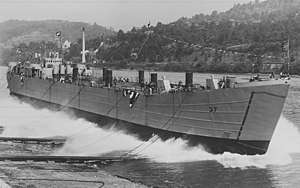USS LST-37
USS LST-37 was an LST-1-class tank landing ship of the United States Navy built during World War II. She was transferred to the Royal Hellenic Navy on 18 August 1943, before being commissioned into the USN.
 Shipyard workers hang on as USS LST-37's hull tastes water for the first time as she is launched at the Dravo Corporation shipyard at Neville Island, Pennsylvania, 5 July 1943. | |
| History | |
|---|---|
| Name: | LST-37 |
| Builder: | Dravo Corporation, Pittsburgh, Pennsylvania |
| Laid down: | 1 April 1943 |
| Launched: | 5 July 1943 |
| Sponsored by: | Mrs. Jack Domb |
| Stricken: | 12 August 1948 |
| Identification: | Hull symbol: LST-37 |
| Fate: | Transferred to the Royal Hellenic Navy, 18 August 1943 |
| Name: | LST-37 |
| Acquired: | 18 August 1943 |
| Fate: | Ran aground and sank, 1 June 1944 |
| General characteristics | |
| Type: | LST-1-class tank landing ship |
| Displacement: |
|
| Length: | 328 ft (100 m) oa |
| Beam: | 50 ft (15 m) |
| Draft: |
|
| Installed power: |
|
| Propulsion: |
|
| Speed: | 12 kn (22 km/h; 14 mph) |
| Range: | 24,000 nmi (44,000 km; 28,000 mi) at 9 kn (17 km/h; 10 mph) while displacing 3,960 long tons (4,024 t) |
| Boats & landing craft carried: | 2 x LCVPs |
| Capacity: | 1,600–1,900 short tons (3,200,000–3,800,000 lb; 1,500,000–1,700,000 kg) cargo depending on mission |
| Troops: | 16 officers, 147 enlisted men |
| Complement: | 13 officers, 104 enlisted men |
| Armament: |
|
Construction
LST-37 was laid down on 1 April 1943, at Pittsburgh, Pennsylvania by the Dravo Corporation; launched on 5 July 1943; sponsored by Mrs. Jack Domb; and transferred to the Hellenic Navy on 18 August 1943.[2]
Service history
LST-37 sailed from Galveston Bar for Key West, Florida, on 28 August 1943, with convoy HK 125, arriving in Key West, 1 September 1943.[3]
On 11 October 1943, LST-37 left Halifax, Nova Scotia, in convoy SC 144,[4] en route she joined convoy WN 497 that had departed Loch Ewe, on 26 October. She arrived in Methil, Scotland, on 28 October with a load of lumber.[5]
Records do not indicate when LST-37 departed Methil, but she most likely sailed on 3 December 1943, in convoy EN 314 (series 2), arriving in Loch Ewe, on 5 December, with her sister ships LST-33, LST-34, and USS LST-36,[6] because she departed Liverpool, England, in convoy OS 61/KMS 35, on 8 December 1943.[7] The convoy split on 20 December 1943, with LST-37 continuing on in convoy KMS 35G, arriving in Gibraltar, on 21 December.[8] She sailed for on in convoy KMS 35, the next day, for Bizerta, Tunisia.[9] It is here that she ran aground on 1 June 1944, and sank.[2]
References
Bibliography
- "LST-37". Dictionary of American Naval Fighting Ships. Naval History and Heritage Command. 30 July 2015. Retrieved 24 August 2018.

- "LST-37". Navsource. Navsource.org. 19 January 2018. Retrieved 24 August 2018.
- "Convoy EN.314 (Series 2)". Arnold Hague Convoy Database. Retrieved 24 August 2018.
- "Convoy HK.125". Arnold Hague Convoy Database. Retrieved 24 August 2018.
- "Convoy KMS.35G". Arnold Hague Convoy Database. Retrieved 24 August 2018.
- "Convoy OS.61/ KMS.35". Arnold Hague Convoy Database. Retrieved 24 August 2018.
- "Convoy KMS.35". Arnold Hague Convoy Database. Retrieved 24 August 2018.